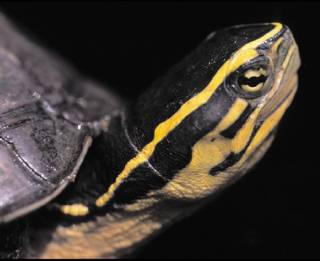 根據「國際野生物貿易研究委員會」(TRAFFIC)一項新的研究報告指出,東南亞箱龜買賣行為脫序,超出合法範圍10至100倍,已導致該物種在印尼部分地區幾近絕跡。
根據「國際野生物貿易研究委員會」(TRAFFIC)一項新的研究報告指出,東南亞箱龜買賣行為脫序,超出合法範圍10至100倍,已導致該物種在印尼部分地區幾近絕跡。
箱龜大部分由印尼進口,在其主要市場香港、中國、新加坡與馬來西亞等地被當作食物與中藥藥材。箱龜在美國、歐洲與日本則視為寵物飼養。
研究指出至少有18個貿易商在爪哇、蘇拉威西(Sulawesi)、蘇門答臘、加里曼丹(Kalimantan)等地,進行東南亞箱龜的非法交易。
每個貿易商每週經手的箱龜平均為2,230隻,總計每年高達210萬隻東南亞箱龜。其中絕大多數出口至其他國家,儘管每年印尼官方的出口配額僅18,000隻箱龜,而該配額量甚至沒有科學根據。
這份報告名為「印尼東南亞箱龜之現況、貿易動態與管理」,作者夏普(Dr. Sabine Schoppe)表示:「現在東南亞箱龜交易量是官方配額的10倍以上,可能更接近100倍。」
18個貿易商中,經調查有13間曾向「森林保護與自然保育局」(PHKA)註冊以進行兩棲類貿易,但其中並不包括箱龜。TRAFFIC近期已將研究結果提交給PHKA。
位於廖內(Riau)與蘇拉威西的採集人員記述了野生東南亞箱龜大量減少的情形,而合法註冊的寵物貿易商則表示與10年前相比,箱龜越來越難取得。
夏普更表示:「目前非法捕獵的情況將導致東南亞箱龜在整個印尼地區消失,採集與貿易中心對此一情形也早有明顯的跡象可循。」
2000年東南亞箱龜被《華盛頓公約》(CITES)列入附錄二(Appendix II)中,其目的在管理野生生物在國際間的貿易行為。儘管如此,該報告發現箱龜在列入華盛頓公約後,交易的情況不減反增,大多數藉由望加錫(Makassar)、梅蘭(Medan)、佩坎巴魯(Pekanbaru)、淡美拉漢(Tembilahan)與馬辰(Banjarmasin)等地的港口走私出國。
TRAFFIC東南亞資深計畫主任薛波特(Chris R. Sheperd)表示:「當局應加強取締非法交易,並定出一實際可行的配額數量,在此範圍內安全地捕獲。」
不檢驗貨運船、偽造CITES出口許可文件、執法官員缺乏訓練等因素,是造成現今法律執行效率不彰最重要的問題。
報告中建議藉由加強人員訓練,配合印尼執法單位與進口國家當局間共同合作,如透過區域組織如東南亞國協野生物執法網路(ASEAN-WEN)與箱龜的族群研究,打擊非法野生生物交易。
資料來源:WWF
Unregulated trade—at 10 to 100 times legal levels—has caused Southeast Asian Box Turtles almost to vanish from parts of Indonesia where they were once common, according to a new report by the wildlife trade monitoring network TRAFFIC.
The turtles are used for meat and in Traditional Chinese Medicine, with major markets in Hong Kong, China, Singapore and Malaysia, mostly supplied from Indonesia. Box turtles are also in demand as pets in the US, Europe and Japan.
The study found at least 18 traders operating in Java, Sulawesi, Sumatra and Kalimantan dealing illegally in Southeast Asian Box Turtles.
Each trader handled an average of just under 2,230 turtles a week, adding up to a combined total of 2.1 million Southeast Asian Box Turtles per year. The vast majority is destined for export, although Indonesia’s official annual export quota for this species is just 18,000 turtles—a figure set without a scientific basis.
“The number of Southeast Asian Box Turtles currently traded is certainly ten times the official export quota, and probably nearer 100 times it,” said Dr Sabine Schoppe, author of the new report, “Status, trade dynamics and management of the Southeast Asian Box Turtle Cuora amboinensis in Indonesia”
Thirteen of the 18 traders investigated were registered for some trade in reptiles, but not in box turtles, with the provincial offices of the Government’s Directorate General of Forest Protection and Nature Conservation (PHKA), which is required to inspect such businesses regularly. TRAFFIC has previously presented the results of the study to PHKA.
Collectors in Riau and Sulawesi reported huge falls in Southeast Asian Box Turtle numbers in the wild, and registered pet traders said they had experienced difficulties in obtaining turtles compared to a decade ago.
“The current level of illegal exploitation will result in Southeast Asian Box Turtles being systematically wiped out across Indonesia, indications of which are already obvious at collection and trade centres, ”said Schoppe.
In 2000, the Southeast Asian Box Turtle was listed in Appendix II of CITES (the Convention on International Trade in Endangered Species of Wild Fauna and Flora), a measure intended to regulate its international trade. However, the report found that following CITES-listing, trade in the box turtles had increased, with the largest numbers being smuggled through the ports of Makassar, Medan, Pekanbaru, Tembilahan and Banjarmasin.
“Authorities should concentrate on eradicating illegal trade, and in setting realistic limits on what numbers can safely be harvested,” said Chris R. Shepherd, Senior Programme Officer with TRAFFIC Southeast Asia.
Weak enforcement of existing laws is a key problem, caused through a combination of factors including non-inspection of shipments, falsification of CITES export permits, and lack of training amongst enforcement officers.
The report recommends better training and more co-operation between Indonesian enforcement authorities and those in importing countries to tackle illegal wildlife trade, for example through initiatives like the ASEAN Wildlife Enforcement Network (ASEAN-WEN), and research into populations of box turtles.




